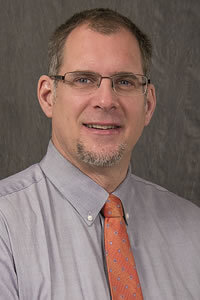Get started with Mizzou
Apply as a freshmanBiomedical Sciences
Undergraduate Certificate
Accurately diagnosing, treating and monitoring diseases and other conditions comes down to one key factor — a comprehensive understanding of the body, whether human or animal, and its structures. Outside of patient care, this knowledge base informs medical research and discoveries like new medications, devices or therapies. It also shapes the study and analysis of population health trends and related response efforts.
Yet, medical and veterinary schools, as well as allied health professional programs, regularly cite a disconnect between undergraduate studies and a deeper, pre-clinical exploration of anatomy and physiology. As a result, students need to quickly catch up before their rotations begin. To supplement existing instruction, Mizzou Online's undergraduate certificate program in biomedical sciences frames broad topics in practical, real-world contexts, creating a bridge between bachelor’s-level preparation and a more focused professional education.
Designed for pre-veterinary, pre-medical and pre-health students, this fully online certificate program introduces standard terminology, delves into how human and animal bodies work and move, and relates these factors to the diagnostic process. This combination not only enhances students’ applications but also equips them to succeed in their respective professional programs and careers.
Please note: The goal of the undergraduate certificate in biomedical sciences is to enhance the knowledge of students in preparation for application to a medical, health profession or veterinary school professional program. The certificate in biomedical sciences is not a professional program and does not supplant professional training.
About the Undergraduate Certificate Program in Biomedical Sciences
Biomedical science forms the backbone of how doctors and veterinarians identify illnesses, why they select treatments and the body’s response to them. Its principles also directly influence medication formulations, rehabilitative therapies and nutritional recommendations.
Leading to these applications is a multifaceted foundation consisting of microbiology, virology, epidemiology, biochemistry, genetics, anatomy, physiology and biomedical engineering. In medical or veterinary school, students absorb these areas to learn more about how the body’s parts and systems move and work together. Beyond muscles, organs and bones, this lens zooms in on tissues, fluids and cellular functions.
However, the more general approach students receive during their pre-medical, pre-veterinary or pre-health studies presents a limited view of what they’ll do on the job. Mizzou’s online undergraduate certificate program in biomedical sciences complements theory with application. For those considering this pathway, the certificate program:
- Jumpstarts their medical knowledge, whether they plan to work with animals or people or enter the research field.
- Provides a dedicated exploration of anatomy and physiology intended to enrich a student’s undergraduate studies.
- Correlates medical, veterinary and allied health prerequisites with advanced subjects and clinical assignments.
- Accents a student’s application, illustrating their commitment to their desired career path.
Quick facts
Official name
Undergraduate Certificate in Biomedical SciencesCampus
Program type
Undergraduate certificateAcademic home
College of Veterinary MedicineDelivery mode
100% onlineAccreditation
Higher Learning CommissionPart time credit hours
16Part time estimated cost
$9,561.60*This cost is for illustrative purposes only. Your hours and costs will differ, depending on your transfer hours, your course choices and your academic progress. See more about tuition and financial aid.

Career prospects
The Bureau of Labor Statistics predicts a surge in health care careers through 2032 — especially for fields centering around biomedical science.
Demand ranges from 3% more roles for pharmacists to 20% more for veterinarians. Allied health professionals have the opportunity to harness this growth as well, including athletic trainers (14%), physical therapists (15%) and genetic counselors (16%).
Consider concentrating your studies with a certificate in biomedical science if you intend to pursue a career:
- Analyzing tissue and fluid samples in a lab.
- Conducting research to develop new medications or medical devices.
- Diagnosing or tracking infectious diseases.
- Treating patients and monitoring their care.
Program structure
The online undergraduate certificate program in biomedical sciences consists of 16 credit hours divided between required courses (13 credit hours) and an elective (three credit hours).
No campus visits are required, and all courses use a semester-based schedule. Students typically take two classes per semester and finish in two years.
Coursework includes
During this certificate program, students get familiar with:
- The Greek, Latin and historical origins of common veterinary and biomedical science terms.
- The anatomy of humans and animal species.
- Cell biology and function in relation to animal health and medical issues.
- Physiology in the context of diagnosis and treatment, with a focus on cardiovascular, renal, respiratory and endocrine systems.
Review all requirements for the online undergraduate certificate program in biomedical sciences.
Delivery
100% onlineCalendar system
Semester-basedTypical program length
2 yearsTypical course load
2 classes per semesterAccreditation
The University of Missouri is accredited by the Higher Learning Commission, one of six regional institutional accreditors in the United States.
Faculty spotlight

Brandon Moore earned a doctorate from the University of Florida in zoology and did post-doctoral training at Tulane University. Dr. Moore’s research interests include crocodilian reproductive anatomy and physiology, and he collaborates with colleagues at universities, zoos and commercial operations in the U.S., South Africa and Argentina. He teaches anatomy and neuroscience courses to veterinary students and BIOMED 3219 Elements of Comparative Anatomy for online undergraduate students.
